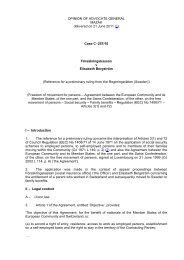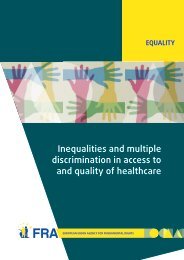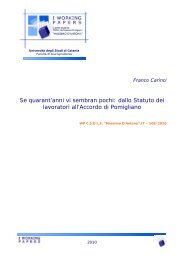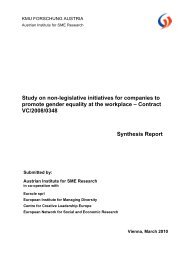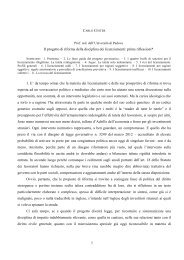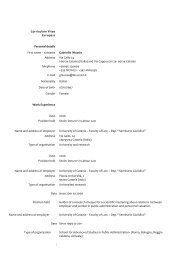Full text - European Trade Union Institute (ETUI)
Full text - European Trade Union Institute (ETUI)
Full text - European Trade Union Institute (ETUI)
You also want an ePaper? Increase the reach of your titles
YUMPU automatically turns print PDFs into web optimized ePapers that Google loves.
Temporary agency work in the <strong>European</strong> <strong>Union</strong><br />
variety of issues, including that after 12 weeks in a given job an agency worker<br />
is entitled to equal treatment (at least the basic working and employment conditions<br />
that would apply to the worker if they had been recruited directly by<br />
that undertaking to occupy the same job). Legislation was also adopted to<br />
introduce provisions on equal pay. Since the implementation of the Directive,<br />
a new strategy seems to have developed in the United Kingdom. Temporary<br />
agency workers are made to sign new employment contracts indicating that<br />
they are now considered permanent employees. <strong>Trade</strong> unions are worried<br />
that this new practice is only a way of avoiding the principle of equal pay and<br />
equal treatment provided by the Directive. Moreover, the British legislator<br />
has introduced what is called a ‘real comparator defence’, which means that<br />
the user can argue that he has complied with the principle of equal treatment<br />
as soon as the agency worker is entitled to the same employment conditions<br />
as a real comparable employee of the user undertaking. The provision carries<br />
a risk. Indeed, the user can employ a token employee on poor conditions of<br />
employment for the purpose of comparison.<br />
In Ireland, the principle of equal treatment is now in force and, in contrast to<br />
the United Kingdom, Ireland decided not to resort to the exception provided<br />
by the Article 5 of the Directive. The principle of equal treatment applies from<br />
the first day. Nevertheless, the exception provided by the paragraph 2 of the<br />
article 5 has been transposed. The principle of equal treatment is not applicable<br />
to temporary agency workers with a permanent employment contract.<br />
Irish law provides some conditions, however. Indeed, the temporary agency<br />
must notify the worker with this kind of contract that the principle of equal<br />
treatment will not apply in a written document. Moreover, when workers are<br />
not employed in a user undertaking, they are entitled to compensation whose<br />
amount must at least equal half of the salary paid during their previous assignment.<br />
This exception only applies regarding pay.<br />
At first sight, Portugal seems to have implemented the Swedish derogation.<br />
National law does not regulate the activity of temporary work in line with the<br />
Directive, especially regarding enforcement of the equal treatment principle.<br />
In fact, the law separates ‘temporary work contracts’, similarly defined as in<br />
the Directive, from ‘open ended contracts for temporary work’. Article 185 of<br />
Law No. 7/2009 provides that during the period of assignment, temporary<br />
workers, whatever the form of their employment contract, are entitled to the<br />
rules applicable at the user undertaking regarding working mode, place and<br />
time, the suspension of the employment contract, health and safety at work<br />
and access to facilities. Between assignments, they are entitled to compensation<br />
whose amount at least equals the national minimum wage or the amount<br />
provided for by the applicable collective agreement in the user undertaking<br />
or the temporary work agency or at least two-thirds of the wage paid for the<br />
last assignment, being the highest amount actually applicable (Article 184).<br />
But this derogation is not in line with the Directive as it is not limited to pay.<br />
Furthermore, the social partners have not been consulted on the issue, as<br />
the Directive required. It remains that in the current not yet amended Portuguese<br />
legislation on temporary agency work, temporary workers are entitled<br />
to the minimum wage provided by the collective agreement applicable in the<br />
WP 2012.13 39





